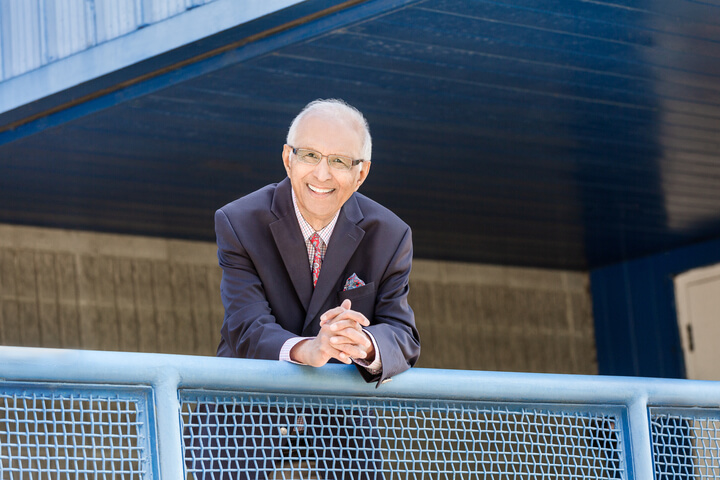AU’s 2019 Distinguished Alumnus embodies lifelong learning
Volunteerism, self-sacrifice, and lifelong learning have been central to Esmail Bharwani’s life since he was a young man in Tanzania, where he struggled to get access to education.
Through hard work and perseverance, he has seen success after success in his life earning several graduate degrees, running a successful business, and setting up a charitable foundation to support students.
“The desire to advance myself was there always. I was restricted by my parents’ financial condition, as I had to help the younger ones in the family and make sure they were all educated,” he said.

The newest accolade he can add to an already lengthy list is being recognized as Athabasca University’s 2019 Distinguished Alumni Award winner.
Bharwani is the oldest son among his siblings and said in his culture that meant he had to take on part of the responsibility of providing for the family. After he finished Grade 8, the highest level he could achieve in his town, he went to work to help support his younger siblings in their own post-secondary pursuits, rather than focusing on his own.
He had to take on work that many people, at the time, considered to be “women’s work.”
“The only job I could get at that time was a job as a treasurer, or a typist. But I had to take the job because I had to support the family,” he said. “There was no chance for me to go to university, because I didn’t have my Grade 12. There was no chance for me to go to university for three years because I had no money. And there was no chance for me to go without sacrificing my younger siblings’ education.”
He found the time to do correspondence courses, and also learned a lot about accounting from his father, so was able to find progressively more responsible work in Tanzania—eventually being promoted to a larger office in Dar Es Salaam, the country’s coastal economic hub.
Bharwani still wanted to pursue a higher education, though, and found three-year intensive accounting training program in England that would lead to a professional accounting designation. So he left Tanzania, and spent the first year of the program living in a hostel and eating little more than a Kit Kat bar and a cup of tea for lunch.
When he told one of his instructors that he couldn’t afford to continue the program and was returning to Tanzania, the instructor asked a friend, who ran an accounting firm next to the school, to hire him as an after-hours bookkeeper. He was then able to finish the program and complete his designation.
In 1973, he came to Canada and in 1976 established an accounting practice. Then in 1978, he began teaching continuing education courses at the University of Calgary. But he still felt he was held back because of a lack of formal schooling.
But Athabasca University provided him with that chance, and after balancing his school work with an already busy life, he earned a Bachelor of Administration degree in 1992. That, in turn, gave him the confidence to pursue other degrees: an MBA jointly from Manchester Business School and the University of Wales, as well as a master of science in entrepreneurial studies from the University of Sterling.
“Athabasca gave me a sense of how distance learning works and gave me the confidence to continue,” he said. “It gave me a big boost, to be able to say I can do it now.”
After selling his accounting practice and retiring in 1999, it didn’t take long for him to realize he wasn’t finished his lifelong learning journey, and wasn’t finished making contributions to his community. So he wrote the LSAT, and in 2001 was admitted to law school at the University of Calgary. He worked as a lawyer full-time until 2011, and continued part-time until 2017 when he again retired.
In 2011 he established the Esmail Safana Farzana Fayaz Bharwani Foundation, and today the foundation gives out 45 awards annually to eligible students, including supporting historically under-represented groups such as international students and immigrants to Canada.
In this way, Bharwani is giving others the same kind of opportunity he was given in England when his instructor got him a job and helped him to finish that first accounting program.
“What he did for me was a very small favour to him, but he had an impact on my life throughout,” he said. “This is my way of saying thank you for what I’ve got, and what I’ve been gifted. Basically, this is a way of saying, I owe you. I owe back to the community. I owe back to the people.”